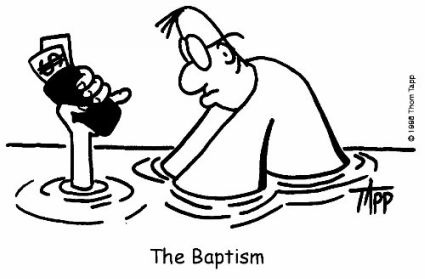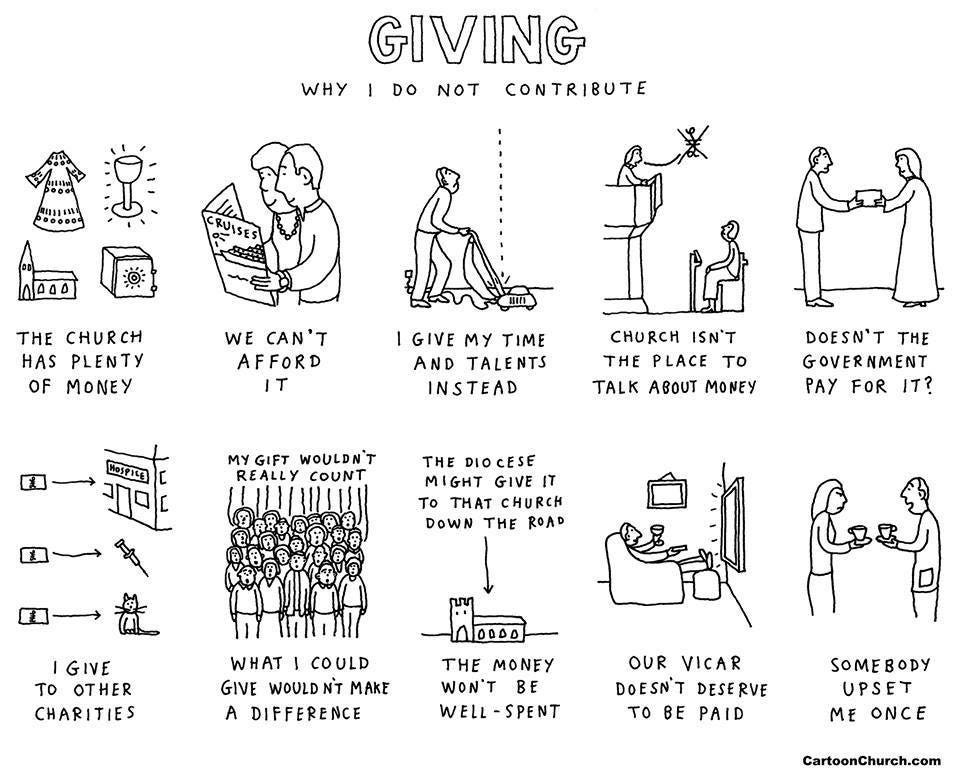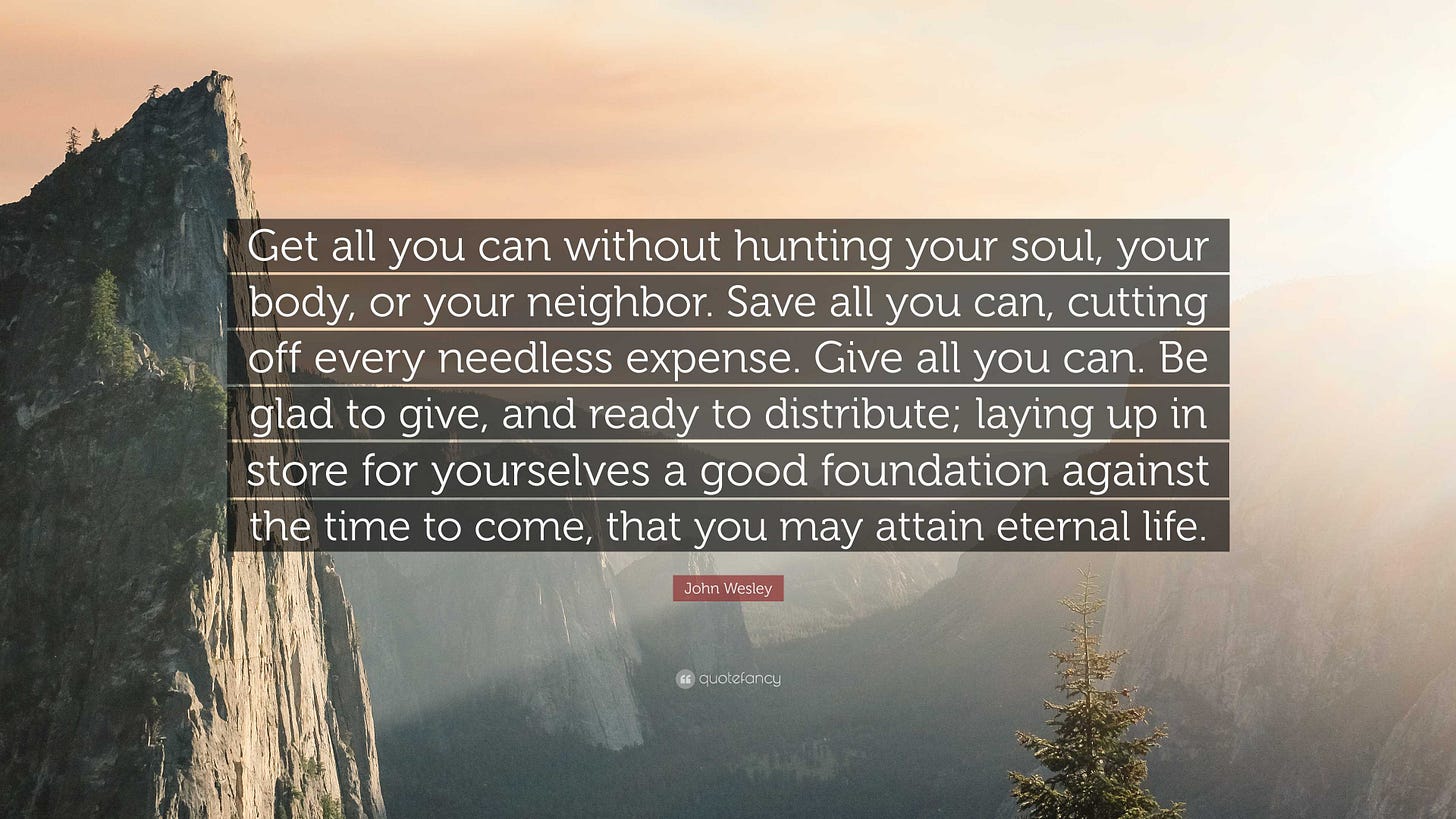“Do not store up for yourselves treasures on earth, where moth and rust destroy, and where thieves break in and steal. But store up for yourselves treasures in heaven, where moth and rust do not destroy, and where thieves do not break in and steal. For where your treasure is, there your heart will be also.”
- Matthew 6:19-21
“Remember this: Whoever sows sparingly will also reap sparingly, and whoever sows generously will also reap generously. Each one should give what he has decided in his heart to give, not out of regret or compulsion. For God loves a cheerful giver.”
- 2 Corinthians 9:6-7
“Those who want to be rich, however, fall into temptation and become ensnared by many foolish and harmful desires that plunge them into ruin and destruction. For the love of money is the root of all kinds of evil. By craving it, some have wandered away from the faith and pierced themselves with many sorrows.”
- 1 Timothy 6:9-10
Prologue
Like everything else that is of this world, money seeks to corrupt the hearts of Christians. In our culture today, money is one of the main idols worshiped, around which the church is often expected to operate. People get particularly sensitive about any talk of money from the pulpit. Many are eager to be uncharitable with any message indicating that one should be expected to be particularly holy in how they spend their money, or that the church is in any sense entitled to the wealth of its constituent members. Many are prone to respond defensively rather than truly considering themselves. That is why many preachers experience great anxiety about speaking with any kind of clarity or boldness on this topic. People will leave. People will stop giving. These fears have caused more than a few pastors to shrink away from preaching faithfully on this part of the faith.
In this sermon I’m going to address a lot of the wrong thinking that tries to gain entry and power in the church around money. I’m going to paint a clear picture of a right relationship with money, especially as it is concerned with the church, such that none of you will be able to show up to the judgment seat of Christ and say that you hadn’t ever heard this message.
I am obligated to give this sermon, first and foremost, because I am an ordained elder, entrusted with instructing you in true doctrine, to the end that you might walk in newness of life. I am under no obligation to kowtow to whatever worldly norms are dominant in the corporate or civic world. Rather, I am compelled by Almighty God to warn you about those alternative worldviews so that you are not so easily snared by the evil one. Speaking on these things faithfully requires breaking a number of cultural taboos. This should not shock you. Christianity is, after all, not of this world.
My Witness
The Lord has blessed me in many respects, including that of money. Sara Beth and I own a rental property in Tennessee, and we are building another one. We have paid off education debt and have good habits of saving and investing. Rather than using these things for our own comfort and glory (you see the vehicles we have, we don’t go on fancy vacations, we don’t wear fancy clothes), we render what we are able to the church. We tithe over 10% of our income to the church annually, while also giving to the poor and persecuted through other organizations. Our family has endowment funds with over $40K invested that pays out to this church in perpetuity. We continue to add to these funds regularly. In the event that we die, our trust stipulates that 51% of our liquidated net worth will go to the church, including a $1 million life insurance policy.
I keep my annual income here below minimum standards for the conference. I have no intention of asking for a raise, even if income goes way up, for reasons I’ll plan on explaining next week. I went down to 3/4 time employment in the last year so that the church would not have to pay an expensive mandatory health insurance bill for me and my family every month. My podcast and writings bring in more than $1K monthly. All of that goes to the church. The Rickmans put our treasure where our hearts are: with the covenant community of Christ. We consider it pure joy to be able to do so.
I have a master’s degree from an esteemed seminary. I am not a bad preacher and could rather easily climb the corporate ladder, so to speak, serving larger, richer churches that would want to pay me a lot more money. I have gotten other job offers in recent years. I choose to stay here, to live humbly, to pour my life into this community out of hopes that many of you will likewise be moved to give of yourself to the cause of Christ here in Nowata. Like St. Paul, I model what Christ requires and encourage you to follow in my example. I talk about living this way, not because I’m so great, but because Jesus is. He is worthy of this. He is also offended if I withhold of myself.
On the Rich
I am not down on the rich. It is not a sin to be rich. Jesus did indeed warn very explicitly about how difficult it is to maintain one’s righteousness as a rich person, but he also accepted the presence and assistance of rich men and women throughout his ministry. The scriptures are clear that the rich are to be exhorted to be humble and gracious about their money, accepting that God shows no partiality, and that much is expected of those to whom much has been entrusted. The rich are made in God’s image no more and no less than everyone else. They have a place in the church no more or less than anyone else.
Stewardship
Fundamental to understanding right relationship with money is to know, firstly, that the money in your bank account, your wallet, your assets—isn’t actually yours. You do not own anything you have, including your money. God does. You are not an owner, but rather a steward, managing the Lord’s assets for him. That is why, when the church was inaugurated in Acts 2, believers did not carry forward the tradition of the tithe from the old covenant, but rather liquidated all of their assets and gave everything to the church. This ethic was so pervasive that, when two early believers chose to lie and withhold some of their money, the Holy Spirit killed them. From the beginning, the church was not meant to be just another beggarly social club with membership dues, but rather an extended family that is collectively stewarding God’s resources for the sake of his glory and for the good of the world. That has not changed. So I don’t preach that we should tithe. I preach that we should spend every dollar entrusted to us for God’s glory and the good of the world. If the church isn’t a big part of that, to your mind, that makes me sad.
Scarcity and Need
Another fundamental doctrinal truth is that God does not need your money, nor does his church. Worldly people will look at the local church as just another worldly institution that needs money in order to pay bills. This is not right at all. This notion demeans and profanes the church. Just like God did not need the sacrifices of the Hebrews (Psalm 50:9-13), he does not need our money. He is just fine without it. Churches that beg, that act like everything is desperate and people need to give or else the church is going to die…these churches are misrepresenting the faith. The true faith doesn’t worry about money. Money will come if God wants us to have money. If the church is making true disciples, then those disciples will joyfully and graciously give. If the church has to cajole its people into giving, then there isn’t anything good to say about that. That is a shame.
The Lord is just fine without us. He doesn’t need us, our money, our prayers, our worship attendance. At all. God is Sovereign. There is nothing we can do to frustrate him or his plans. He offers us salvation, not because he needs us, but because he loves us. He allows us to participate in our salvation because he loves us. So everything we do in the life of faith is in response to his love. We render all that we have to him, not because he needs it, but because he deserves it. He is worthy. Moreover, it is we who need to give. God has given us these spiritual practices of prayer, fasting, and almsgiving for OUR sakes.
Satan is pleased when we operate from a mindset of scarcity and fear. He is pleased whenever churches wring their hands at the prospect of not being able to pay the bills, when they hoard tons of money and refuse to be bold in ministry. If the evil one can keep us paranoid about worldly notions of fiscal solvency and healthy longevity, then we can talk a good game about the gospel, but our witness lacks power. Here’s a truth: A person and a church’s true faith is exposed by their posture towards money. If you love it too much, such that it compromises how faithful you’re willing to be, then it is an idol that will drag you to hell.
In our church we struggle with this. Our church has plenty of money to stay afloat doing what we are doing just fine for many years. It is true that, on a monthly basis, we are generally not taking in as much as we are spending. That is, in the offering plate. Yet our net worth as a church has gone up $46K since the beginning of the year. We have some great outside help that is buttressing our church, such that we have a healthy endowment and investment fund. So any anxiety folks convey about money issues in this church is not appropriate.
I need to be more precise. If it is the case that we have members who could give more to God’s mission through the church, but they are choosing not to, then we should be worried. But the thing we should worry about is not making ends meet. It should be that we are not moving members to be disciples. But if all of our members are giving all that they can, and this is the best we can do, then everything is okay.
Jesus was very clear that our lives are not to be spent worrying about money. The fact that we nakedly run the church out of such fear is a defeat of our faith, especially when our financial standing continues to improve. When I first moved here ten years ago, the church’s net worth was about $130K. Since then, it has increased by a factor of six. That despite paying interns and part time positions, a hefty disaffiliation fee, HVAC and roofing overhauls, and crazy expensive and rising insurance rates. Any fears about the insolvency of the church are hypothetically a possibility, but they are an unfaithful distraction from much more pressing concerns. You should indeed give to the church, but not because God needs it, nor because the church needs it. If those are the reasons you are giving, then you should stop giving. You should not see giving to the church as a civic obligation. It should be a joyful act, participating in your own salvation and submitting to the Master who has given you all you have.
Giving should be done out of an acknowledgment that your money is actually God’s. It is an obedient act of submission to your Lord. If you are not willing to give to the Lord to the degree that your way of life has to be humbler than it would otherwise be, then your faith is exposed as lacking.
You should give to the church because she is the bride of Christ and you love her. Because your wellbeing is tied up with her. Because you understand the church to be a heavenly place on earth, a people that God cherishes and loves, to which you have bound yourself through the waters of baptism and the fellowship of the Holy Spirit. People who understand the nature of the church do not have to be begged to give to her.
Failures of Faith in Our Finances
Many in America today refuse to give out of a cynical mindset. We hate the way that our government spends our money, the drug addict on the corner spends our money. Heck, we left our old denomination because they were being faithless with our money. A lot of organizations today refuse to be financially transparent because they know certain misers in their midst will come after them for the way that they spend their money. It is a crippling fear that is actually destroying organizations. Institutions refuse to report transparently, which causes folks to suspect foul play, which is often revealed, and then institutions rightly crumble. This is what is happening to our former denomination. As many of you look around at the failure of historic institutions to do what they have been tasked to do, it is a natural thing to let that poisonous distrust spread to some suspicion of your church.
That is why Sara Beth has our full church financials posted outside the church office. You can see all our line items on our budget, all our funds. There should be no room for suspicion here. I have told you openly of my own personal finances. You can see my salary on those forms and see that your offering is not going towards making a pastor wealthy. It isn’t being spent on luxury items. It is rather going to build something that can save many more people in our area of influence. That is what the church is here to do: save lost sinners. Turning dollars into disciples is the financial task of the church. If you think our church can do a better job at that, then please come to our board meetings, speak and pray with us. Reviewing how we spend our money is the right of every giving member of the church. The purpose isn’t to blow holes in our shared venture, but to include everyone in the shared task of discipleship. People who want to tear down will eventually find their way out of the church. Those who want to build something beautiful for God should find this a great people and place to do exactly that.
Even so, in any group, decisions will sometimes be made that individuals don’t feel good about. You might think something is wasteful, or ineffective, or even offensive. That is one of the reasons why so many voluntary organizations are failing nowadays. Folks have lost the ability to be gracious. It is important for us to understand something: Once I give money away, I lose control of it. That means I don’t have to answer to God for how it is felt. If the government spends the money I rendered in order to indoctrinate Pakistanis through USAID, I am not morally culpable. If the panhandler on the street uses my money on whiskey, again, I’m not culpable. If my church spends money on something stupid, then again, I’m not culpable. But if I withhold of myself because the people in charge of the church don’t do things exactly the way that I like, then that is something I’m going to have to answer to God for. Same with you. It is my job to warn you.
Now, if it turns out that I am deluded and this actually isn’t a church and we shouldn’t be funded, then not only should you not give, but you shouldn’t be here. Don’t waste your time and presence on something that is counterfeit or wrong. But if this is a church and if we are tasked with a holy mission in this town, then you should be eager, champing at the bit, to give as much as you are able. You should be eager to learn about the good our money has done in building a church building in Abuja, Nigeria, in helping keep foster kids in healthy homes in Nowata County, in supporting the new Heartland Annual Conference.
Wills & Trusts
The Rickmans shouldn’t be the only members with endowments aimed at building up the church in perpetuity. We shouldn’t be the only ones making the church a significant beneficiary in our wills or trusts. That should be a normal thing for all believers. Maybe some of you have done this and just haven’t told me, which is your prerogative. But if you haven’t made the church such a priority, then I would urge you to augment your budget accordingly. I have been surprised at the number of people who have been members of our church who died and left nothing at all to the church. I don’t know how to interpret that. If Jesus is right and our hearts are to be found with our treasures, then it is a very obvious conclusion that believers should be making their church a beneficiary.
Summary & Exhortation
If I were to boil down my message today, it would be an encouragement to actually believe, to actually be in the church. Trying to negotiate a fractional faith, a lukewarm faith of lackluster commitment, is a depressing affair. Such a faith will always leave you dissatisfied and insecure. Every week I’m telling you to give this thing your all. I tell you to be in your scriptures and prayer constantly, to fast, to get to know your neighbors and minister to them, to spend time making friends with your brothers and sisters in Christ here. Today’s sermon is just an extension of that. Give your all to Jesus, and you will find that it was the best investment you ever made. Choose to give anything less than that, and you will carry a deep regret. I would save you from that if I could.
I believe God is powerful and able to free us from our love of money, from the ways in which we excuse our selfishness. I believe our faith is so powerful as to cure us of fleshly desires, such that we can actually give joyfully and graciously. And as we do so, I know that we will come to see the church as a lot more than just a social club. It’ll be the very people of God, marching joyfully to heaven together.
Next Week
Next week I’m going to speak plainly about what all this money can and should be used for in the church. What kind of ministry is the Lord calling this church to do in the heart of Nowata? How is he requiring that we administer the blessings he has endowed us for his glory and for the good of the lives we touch? I have some very particular answers to this that I’ll speak to directly, so I would urge you to make it a priority to be in attendance next week.

















Share this post